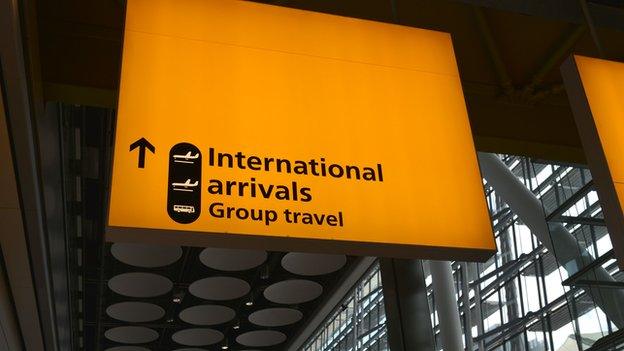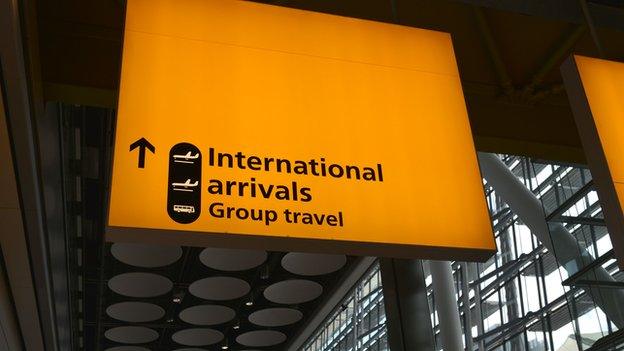Skilled workers immigration cap hit
- Published
- comments

The government's immigration cap for non-EU skilled workers has been hit for the first time, blocking the arrival of some nurses, doctors and teachers.
The cap, which applies to posts earning above £20,800, is a measure introduced under the coalition government in 2011.
The Home Office has confirmed that the monthly allocation of so-called "Tier 2" visas has been filled for June.
There were 1,650 allocations for June, but the Home Office will not confirm how many applications it received.
The BBC understands that as well as nurses, doctors and teachers other visas refused were applications to bring in accountants, solicitors and management consultants.
Under the Tier 2 scheme, external, there are 20,700 posts available a year to employers who want to recruit a non-EU skilled worker.
Applicants have more chance of success if the company is trying to fill a post on a national list of shortage occupations, external. The BBC understands that none of the visas refused this month under the cap relates to a job on that list.
On Thursday, Prime Minister David Cameron announced plans to make it harder to bring in skilled staff from outside the EU, saying, it was too easy for some businesses to employ these workers, rather than train British employees.
Immigration Minister James Brokenshire said there were no plans to change the current Tier 2 limit - and the independent Migration Advisory Committee would be advising on further reducing economic migration from outside the EU.
"Our reforms will ensure that businesses are able to attract the skilled migrants they need," he said. "But we also want them to get far better at recruiting and training UK workers first."
But some business representatives predicted that enforcing the cap would be damaging.
Mark Hilton, head of immigration policy at London First, said: "Every skilled migrant we turn away as a result of this cap will hit jobs and growth.
"Of course business wants to hire locally, but you can't just magic people up with highly specific skills because they take years to develop."
Madeleine Sumption, director of the Migration Observatory at Oxford University, said: "The cap has been hit at a time when many companies are hiring recent graduates from both the UK and overseas.
"In the short term there is likely to be some disruption for businesses that have been counting on hiring specific candidates.
"More broadly, the cap is reshaping the skilled migration system as we know it in the UK, making it much more difficult for businesses and the public sector to hire lower-paid skilled workers, including nurses and younger people - who tend to earn less.
"In terms of the impact on net migration it is likely to be relatively small - non-EU workers made up 13% of UK immigration in 2014."
The Migration Advisory Committee has been asked to report by the end of the year on further restricting work visas to a narrower range of job shortages or highly specialist experts. Ministers are also proposing a "skills levy" on visas to fund UK apprenticeships and raising salary thresholds to prevent firms using foreign workers to undercut wages.
- Published10 June 2015
